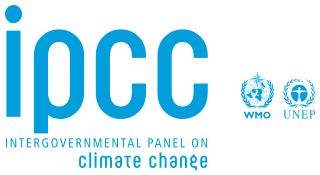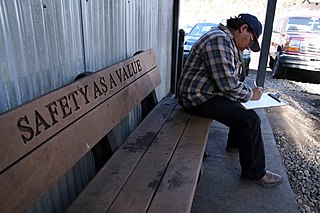Related Research Articles

The Intergovernmental Panel on Climate Change (IPCC) is an intergovernmental body of the United Nations. Its job is to advance scientific knowledge about climate change caused by human activities. The World Meteorological Organization (WMO) and the United Nations Environment Programme (UNEP) set up the IPCC in 1988. The United Nations endorsed the creation of the IPCC later that year. It has a secretariat in Geneva, Switzerland, hosted by the WMO. It has 195 member states who govern the IPCC. The member states elect a bureau of scientists to serve through an assessment cycle. A cycle is usually six to seven years. The bureau selects experts in their fields to prepare IPCC reports. There is a formal nomination process by governments and observer organizations to find these experts. The IPCC has three working groups and a task force, which carry out its scientific work.

Social science is one of the branches of science, devoted to the study of societies and the relationships among individuals within those societies. The term was formerly used to refer to the field of sociology, the original "science of society", established in the 18th century. In addition to sociology, it now encompasses a wide array of academic disciplines, including anthropology, archaeology, economics, geography, linguistics, management, communication studies, psychology, culturology and political science.

In economics and finance, risk aversion is the tendency of people to prefer outcomes with low uncertainty to those outcomes with high uncertainty, even if the average outcome of the latter is equal to or higher in monetary value than the more certain outcome.

Travel behavior is the study of what people do over geography, and how people use transport.
Traffic psychology is a discipline of psychology that studies the relationship between psychological processes and the behavior of road users. In general, traffic psychology aims to apply theoretical aspects of psychology in order to improve traffic mobility by helping to develop and apply crash countermeasures, as well as by guiding desired behaviors through education and the motivation of road users.

Risk compensation is a theory which suggests that people typically adjust their behavior in response to perceived levels of risk, becoming more careful where they sense greater risk and less careful if they feel more protected. Although usually small in comparison to the fundamental benefits of safety interventions, it may result in a lower net benefit than expected or even higher risks.
Seat belt legislation requires the fitting of seat belts to motor vehicles and the wearing of seat belts by motor vehicle occupants to be mandatory. Laws requiring the fitting of seat belts to cars have in some cases been followed by laws mandating their use, with the effect that thousands of deaths on the road have been prevented. Different laws apply in different countries to the wearing of seat belts.

The Second Assessment Report (SAR) of the Intergovernmental Panel on Climate Change (IPCC), published in 1995, is an assessment of the then available scientific and socio-economic information on climate change. The report was split into four parts: a synthesis to help interpret UNFCCC article 2, The Science of Climate Change, Impacts, Adaptations and Mitigation of Climate Change, Economic and Social Dimensions of Climate Change. Each of the last three parts was completed by a separate Working Group (WG), and each has a Summary for Policymakers (SPM) that represents a consensus of national representatives.

Roger A. Pielke Jr. is an American political scientist and professor, and was the director of the Sports Governance Center within the Department of Athletics at the Center for Science and Technology Policy Research at the University of Colorado Boulder.
Behavior change, in context of public health, refers to efforts put in place to change people's personal habits and attitudes, to prevent disease. Behavior change in public health can take place at several levels and is known as social and behavior change (SBC). More and more, efforts focus on prevention of disease to save healthcare care costs. This is particularly important in low and middle income countries, where supply side health interventions have come under increased scrutiny because of the cost.
Environmental psychology is a branch of psychology that explores the relationship between humans and the external world. It examines the way in which the natural environment and our built environments shape us as individuals. Environmental psychology emphasizes how humans change the environment and how the environment influences humans' experiences and behaviors. The field defines the term environment broadly, encompassing natural environments, social settings, built environments, learning environments, and informational environments. According to an article on APA Psychnet, environmental psychology is when a person thinks to a plan, travels to a certain place, and follows through with the plan throughout their behavior.

Safety culture is the element of organizational culture which is concerned with the maintenance of safety and compliance with safety standards. It is informed by the organization's leadership and the beliefs, perceptions and values that employees share in relation to risks within the organization, workplace or community. Safety culture has been described in a variety of ways: notably, the National Academies of Science and the Association of Land Grant and Public Universities have published summaries on this topic in 2014 and 2016.
The Earth Institute is a research institute at Columbia University created in 1995 for addressing complex issues facing the planet and its inhabitants, with a focus on sustainable development. With an interdisciplinary approach, this includes research in climate change, geology, global health, economics, management, agriculture, ecosystems, urbanization, energy, hazards, and water. The Earth Institute's activities are guided by the idea that science and technological tools that already exist could be applied to greatly improve conditions for the world's poor, while preserving the natural systems that support life on Earth.
Climate risk is the potential for problems for societies or ecosystems from the impacts of climate change. The assessment of climate risk is based on formal analysis of the consequences, likelihoods and responses to these impacts. Societal constraints can also shape adaptation options. There are different values and preferences around risk, resulting in differences of risk perception.

The Potsdam Institute for Climate Impact Research is a German government-funded research institute addressing crucial scientific questions in the fields of global change, climate impacts, and sustainable development. Ranked among the top environmental think tanks worldwide, it is one of the leading research institutions and part of a global network of scientific and academic institutions working on questions of global environmental change. It is a member of the Leibniz Association, whose institutions perform research on subjects of high relevance to society.

A traffic collision, also known as a motor vehicle collision, or car crash, occurs when a vehicle collides with another vehicle, pedestrian, animal, road debris, or other moving or stationary obstruction, such as a tree, pole or building. Traffic collisions often result in injury, disability, death, and property damage as well as financial costs to both society and the individuals involved. Road transport is statistically the most dangerous situation people deal with on a daily basis, but casualty figures from such incidents attract less media attention than other, less frequent types of tragedy. The commonly used term car accident is increasingly falling out of favor with many government departments and organizations, with the Associated Press style guide recommending caution before using the term. Some collisions are intentional vehicle-ramming attacks, staged crashes, vehicular homicide or vehicular suicide.

The 2007 Nobel Peace Prize was shared, in two equal parts, between the Intergovernmental Panel on Climate Change (IPCC) and United States former vice president, Al Gore "for their efforts to build up and disseminate greater knowledge about man-made climate change, and to lay the foundations for the measures that are needed to counteract such change".
The environmental sustainability problem has proven difficult to solve. The modern environmental movement has attempted to solve the problem in a large variety of ways. But little progress has been made, as shown by severe ecological footprint overshoot and lack of sufficient progress on the climate change problem. Something within the human system is preventing change to a sustainable mode of behavior. That system trait is systemic change resistance. Change resistance is also known as organizational resistance, barriers to change, or policy resistance.

Behavioural design is a sub-category of design, which is concerned with how design can shape, or be used to influence human behaviour. All approaches of design for behaviour change acknowledge that artifacts have an important influence on human behaviour and/or behavioural decisions. They strongly draw on theories of behavioural change, including the division into personal, behavioural, and environmental characteristics as drivers for behaviour change. Areas in which design for behaviour change has been most commonly applied include health and wellbeing, sustainability, safety and social context, as well as crime prevention.

The Sixth Assessment Report (AR6) of the United Nations (UN) Intergovernmental Panel on Climate Change (IPCC) is the sixth in a series of reports which assess the available scientific information on climate change. Three Working Groups covered the following topics: The Physical Science Basis (WGI); Impacts, Adaptation and Vulnerability (WGII); Mitigation of Climate Change (WGIII). Of these, the first study was published in 2021, the second report February 2022, and the third in April 2022. The final synthesis report was finished in March 2023.
References
- ↑ Foster, Lynn (26 May 2024). "John Adams obituary". The Guardian.
- ↑ johnadams (14 May 2010). "Letter not published in New Scientist". John Adams. Retrieved 17 February 2013.